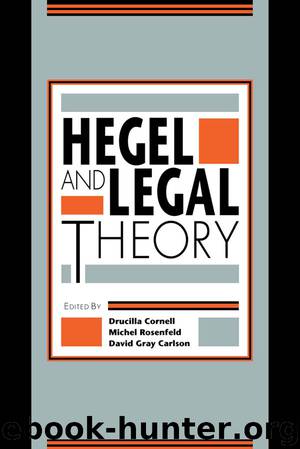Hegel and Legal Theory by Unknown

Author:Unknown
Language: eng
Format: epub
ISBN: 9781317857327
Publisher: Taylor and Francis
Published: 2014-02-25T00:00:00+00:00
I
In a constructivist conception, the standpoint of the normative is conceived as wholly immanent in the activity of the choosing self. Constructivism postulates a certain conception of responsible agency and elucidates the normative in terms of that conception. What, then, is the conception of responsible agency that informs Hegel's constructivism and how does his understanding of the standpoint of the normative in terms of the general concept of free will satisfy the constructivist requirement of immanence? I can address these important questions here only in the briefest way.
At the basis of Hegel's constructivism lies a conception of responsible agency that is, in its fundamental terms and import, very much like that of Kant.6 The general concept of the free will, as explicated by Hegel, views responsible agency as self-conscious purposive activity which is unqualifiedly self-determining in character. Hegel refers to the free will as a “thinking” will.7 Being purposive, such activity begins with, and is directed toward, the realization of a conception formed by the subject; it is rooted therefore in thinking rather than in instinct or in some other merely natural necessity. More exactly, free will postulates a self-conscious subject that views itself as wholly independent of everything given to it prior to its activity and that therefore has itself qua free for its object. And it is in virtue of this thought of itself as free that the subject is self-determining.
Now the fact that the subject is free just insofar as it views itself as such is itself something which the subject knows and which it seeks to make explicit. It does this by making the realization of this conception of itself its essential aim and purpose. The free will is thus thinking that gives its conception of itself existence in the element of self-conscious purposive activity. Or, conversely, it establishes self-conscious purposive activity as an exhibition of its conception of itself as free. Thinking in its theoretical function, or as cognition, has an object that, in relation to itself, must at least in part be taken as prior and independent. In contrast, thinking in its practical function, or as free will, gives itself an object that is wholly constituted through its own activity—an object that, far from being different from or independent of it, is the subject's very same conception of itself as free, only in the form of realized existence.8
As I said in the introductory remarks, the general concept of free will is analysed under the two aspects of form and content. I also suggested that we may view the aspects of form and content as referring respectively to the moral powers of free and equal persons and the ensemble of conditions (both internal and external to the self) in which that conception of the person is realized. Let us now take a closer look at what these two aspects entail. The general concept of free will, viewed under the aspect of form, has a structure that may be analysed in the following three steps. I
Download
This site does not store any files on its server. We only index and link to content provided by other sites. Please contact the content providers to delete copyright contents if any and email us, we'll remove relevant links or contents immediately.
| Africa | Americas |
| Arctic & Antarctica | Asia |
| Australia & Oceania | Europe |
| Middle East | Russia |
| United States | World |
| Ancient Civilizations | Military |
| Historical Study & Educational Resources |
Cat's cradle by Kurt Vonnegut(15334)
Pimp by Iceberg Slim(14487)
4 3 2 1: A Novel by Paul Auster(12375)
Underground: A Human History of the Worlds Beneath Our Feet by Will Hunt(12085)
The Radium Girls by Kate Moore(12017)
Wiseguy by Nicholas Pileggi(5769)
The Fire Next Time by James Baldwin(5431)
Perfect Rhythm by Jae(5398)
American History Stories, Volume III (Yesterday's Classics) by Pratt Mara L(5299)
Paper Towns by Green John(5177)
Pale Blue Dot by Carl Sagan(4996)
A Higher Loyalty: Truth, Lies, and Leadership by James Comey(4954)
The Mayflower and the Pilgrims' New World by Nathaniel Philbrick(4491)
The Doomsday Machine by Daniel Ellsberg(4484)
Killers of the Flower Moon: The Osage Murders and the Birth of the FBI by David Grann(4435)
The Sympathizer by Viet Thanh Nguyen(4384)
Too Much and Not the Mood by Durga Chew-Bose(4337)
The Borden Murders by Sarah Miller(4312)
Sticky Fingers by Joe Hagan(4188)
